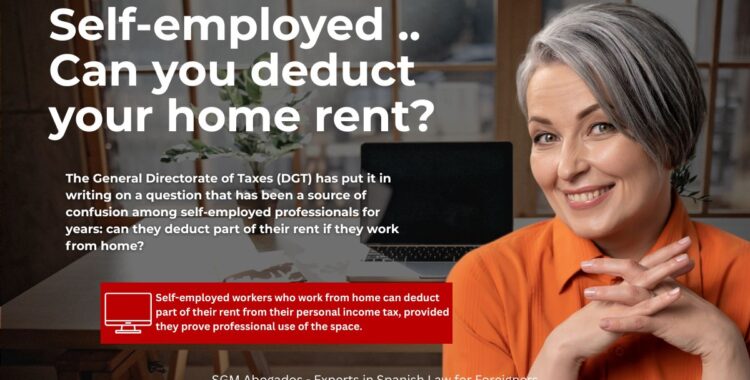Self-employed Can Deduct Their Rent
The Treasury clarifies when self-employed workers can deduct their home rent.
Self-employed workers who work from home can deduct part of their rent from their personal income tax, provided they prove professional use of the space.
The General Directorate of Taxes (DGT) has put it in writing on a question that has been a source of confusion among self-employed professionals for years: can they deduct part of their rent if they work from home?
The answer is yes, but with conditions. According to binding consultation V1293-25 , issued on July 11, 2025 , self-employed individuals who rent can deduct the expense corresponding to the portion of the property used for their activity from their personal income tax .
However, the deduction will only be valid if the space is capable of being used independently from the rest of the property and the personal use is merely accessory or irrelevant , in accordance with the provisions of article 22 of the Personal Income Tax Regulations and articles 28 to 30 of Law 35/2006 .
Requirements for deducting housing rent from personal income tax
The key lies in the partial use of the home . The regulations only allow the expense to be deducted if the workspace can be used separately and independently from the rest of the property.
In practical terms, the area designated for work must be clearly identified : for example, if a self-employed person regularly uses a 12-square-meter room in a 40-square-meter home, they can deduct 30% of the monthly rent.
Once this requirement is met, the self-employed person may deduct the rental expense according to the percentage of the property actually used for economic activity , provided that this proportion is documented and reflected in their accounting records.
Rental contract in the name of the self-employed person
Although the law doesn’t require the lease to be in the name of the self-employed person , in practice, it’s a key factor in allowing the Treasury to recognize the deduction. If it’s registered in someone else’s name—for example, a partner or a family member—the expense could be considered not directly related to the activity , unless the self-employed person can provide reliable proof that they are responsible for paying it and that the property is used partially for professional purposes.
How to justify the rental expense?
Working from home isn’t enough: the deduction must be correctly reflected in the accounting and rigorously documented . The DGT reminds us that it is essential to record the expense in the self-employed person’s official books and keep supporting documents that prove the relationship between the rental and the activity.
The State Tax Administration Agency will be responsible for verifying and assessing the evidence provided . The most relevant documentation includes the lease agreement , payment receipts , and, where applicable, plans or photographs that identify the work area.
Can I deduct my rent if I don’t have a dedicated room to work in?
Not quite. The deduction requires that the space be identifiable and separate from personal or family use . If you work in the living room or a shared area, the Treasury may deem that there is no independent partial allocation , unless the private use is clearly incidental and occasional.
What happens to the owners of the property?
It’s important to note that this tax advantage for self-employed individuals also applies to landlords. If a self-employed tenant uses part of the property as a workplace, the owner could lose the reduction in personal income tax for renting a primary residence , which can reach 90% in high-stress areas.
The reason is precisely the professional use of part of the home, which prevents it from being considered, for tax purposes, as intended entirely for residential use.
Can the deduction be applied if the contract does not specify professional use?
A self-employed person can deduct part of their rent from their personal income tax even if the lease agreement doesn’t expressly mention the property’s professional use. The Tax Agency doesn’t require this mention, provided the taxpayer can prove actual use of part of the property for their business and demonstrate a direct connection to the expense .
However, it is advisable to review the terms of the contract , since many landlords include a clause limiting the use of the property exclusively to residential purposes or to meeting the tenant’s permanent housing needs, in accordance with Article 2 of the Urban Leasing Law .
Although this restriction does not negate the deduction , it can create tension if the owner fears losing his personal income tax reduction for leasing his primary residence , which requires strictly residential use.
In any case, partial use for professional purposes does not alter the nature of the lease contract for habitual housing in accordance with the Urban Leasing Law , provided that the main purpose remains residential.
Finally, partial allocation may affect other regional deductions or aid , such as the youth rental bonus or deductions for primary residence , depending on the regulations of each community.
Is it possible to deduct other household expenses along with rent, such as electricity or internet?
Self-employed individuals who work from home can also deduct part of their utilities —such as electricity, water, or gas—in proportion to the space used for their professional activity.
A Supreme Court ruling , issued on July 15, 2025, has confirmed that a fraction of the VAT on these expenses can also be deducted , provided that professional use is duly accredited.
Although the ruling refers to the scope of VAT, it consolidates the principle of proportionality that governs both tax instruments: only the percentage represented by the surface area used for the activity can be deducted.
Keys to deducting rent and avoiding problems with the Treasury
Deducting rent is a real possibility for many self-employed individuals, but it’s not an automatic or unlimited benefit. As we mentioned, the Treasury allows you to deduct a portion of your monthly rent from your income only if three essential conditions are met: the workspace must be separate from personal use , the expense must be recorded in the accounting records , and it must be duly justified to the Tax Agency.
The DGT’s criteria provide greater legal certainty for those who work from home, although it makes it clear that not everything is valid, as the Administration will require clear, coherent, and organized evidence .
The key is summed up in three words that summarize the philosophy of this deduction: proportionality, independence, and justification . A well-documented contract, a designated office within the home, and organized accounting are the elements that allow you to prove the validity of the deduction to the Treasury and reduce the risk of it being challenged.











